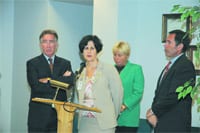Rest of the Story – Children Need Plenty of Sleep; Make Sure They Get It
What child doesn’t want to stay up longer when they hear those four dreaded words: “it’s time for bed?” And it’s not just kids. Adults, too, often stay up past their ideal bedtime to watch late-night talk shows.
Why is getting a good night’s sleep so important?
It is needed to maintain good overall health, and recent studies indicate that it may help prevent obesity. For kids, it’s especially important because lack of sleep can impair a child’s ability to pay attention and concentrate in school and can interfere with the retention of information learned in the classroom.
So, how much sleep does your child really need?
Newborns 0-2 months should be getting 12-18 hours of sleep, infants 3-11 months old need 14-15 hours, toddlers 1-3 years old should get 12-14 hours, preschoolers 3-5 years old need 11-13 hours, school-age children 5-10 years old require 10-11 hours, and teens 10-17 years old need 8.5-9.25 hours, while adults can survive with 7-9 hours of Zs.
However, according to the National Sleep Foundation’s 2014 Sleep in America Poll, many children don’t get enough sleep on school nights, with some getting less sleep than their own parents think they need. Parents were also asked how much sleep they thought their child needed to be at his or her peak level of functioning. Roughly 26{06cf2b9696b159f874511d23dbc893eb1ac83014175ed30550cfff22781411e5} estimated this number to be at least one hour more than they say their child actually gets on a school night.
The poll suggests that parents do understand the importance of quality sleep even if they do not always think their children get it; more than 9 in 10 parents think sleep is extremely or very important for their child’s performance in school, health and well-being, and mood and behavior the next day.
The Sleep in America Poll also concluded that children sleep better when parents establish rules and limit technology use in the bedroom and before bedtime.
Some Good Advice
If you are having trouble getting your kids to sleep, consider the following tips for toddlers to teens, many of which are also helpful for adults who want to get a good night’s sleep as well:
• Establish a consistent bedtime routine. Reading to your child or setting bath time just before going to bed can help a child establish a routine by recognizing what follows next — sleepy time.
• Your child should be somewhat relaxed before going to bed. If his or her stress levels are piqued, it will only make it difficult to relax and fall asleep. So any bedtime activities should be kept to a minimum and not excite the child.
• Make sure that all televisions, computers, and cell phones are off in the room. Not only can their light be distracting, but the temptation is also there to use them instead of keeping their head on the pillow.
• Set the right mood in the bedroom to enhance sleep. It should be dark, quiet, and cool, all of which make it easier to fall asleep.
• Don’t let your child oversleep. They may not be tired when it comes to bedtime, throwing off their routine.
As with anything, parents serve as important role models for their children, and the same applies to good sleep habits. Parents, therefore, should follow the same rules of good sleep hygiene that they expect their children to follow.
Sleep Disorders
If you’ve put your best efforts forward to help your child get the sleep he or she needs, yet they still have difficulty falling asleep or wake up during the night with nightmares or night terrors, then talk with your pediatrician about your concerns and the possibility that your child might have a sleep disorder.
Children can suffer a number of sleep disorders, which may include behavioral insomnia, delayed-sleep-phase syndrome — a circadian-rhythm sleep disorder common in adolescents — sleep apnea, and various other sleep disturbances, such as sleepwalking and sleep terrors.
Baystate Children’s Hospital provides the region’s only pediatric sleep studies — polysomnography (PSG) — for children of all ages, including preemies, as well as sleep evaluations by a team of pediatric pulmonologists, psychologists, and pediatric sleep specialists and neurologists. The PSG laboratory is located in the Neurodiagnostics and Sleep Center at Baystate Medical Center. All sleep studies are performed by a PSG technicians trained to deal with children.
For more information on sleep studies, both pediatric and adult, call Baystate’s Neurodiagnostics and Sleep Center at (413) 794-5600.


Comments are closed.